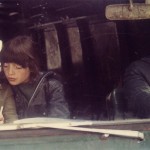Tag: Decade: 1980s
-

Films of the ’80s (part 1)
Short responses to films by Maurice Pialat, William Friedkin, Louis Malle, Paul Schrader, Nicolas Roeg, Mike Leigh, and Michel Deville.
-

Films of the ’80s
While watching Les Bons Debarras, I was struck by how familiar it felt. I was eight when the film was released — near enough to the age of Manon (Charlotte Laurier) that I was able immediately to recognize that particular era of childhood, even if her experience of it is so much different from my own.
-
Collins and Jost
What most interests me — and what I lack a vocabulary to properly describe — is the direct connection between the form and political content in both of these films. That brief frisson that occurs when the pose drops — when a person who lives in an image-marketed and -mediated culture suddenly finds herself set adrift in the semiological flux — that moment, I think, is an instance of political resistance.
-

Chocolat (1988)
Reviewers who have deemed “unnecessary” the framing device involving the adult France have completely misread Chocolat, I think. While there is much to recommend in the film—Agnes Godard’s cinematography, the many fine performances, and Denis’s typically seductive pacing, to name just a few—Denis’s handling of the film’s subjective perspective is what differentiates this film from other earnest and well-intentioned examinations of racism and/or colonialism.
-

Damnation (1988)
Would Tarkovsky’s style, siphoned through another imagination, produce a similar effect? Would any of that strange poetic logic survive the translation? Béla Tarr’s Damnation makes for an interesting case study.
-

Great Directors: Hal Ashby
This essay was originally published at Senses of Cinema.
-

Full Metal Jacket (1987)
I wonder if it might be more useful to call FMJ an anti war-movie movie. For the auteur is obviously fascinated, in a deliberately self-reflexive way, with the influence of images and storytelling on the formation of what might be described as ideological mythology.
-
Broom of the System (1987)
Lenore Beadsman’s life is complicated. The 24 year old heir to the Beadsman baby food empire struggles to balance her career as a call center operator — where the lines of communication seem perpetually crossed — with her, um, complex relationship with her boss, Rick Vigorous, of Frequent and Vigorous Publishing.
-
Sculpting in Time (1987)
I’ve never read another book like Sculpting in Time. In it Tarkovsky speaks as eloquently about art as he does faith and philosophy, and does so in a remarkably kind, concerned voice. To him, his subject —the unique ability of the cinematic image to touch the soul and inspire spiritual improvement — is quite literally a matter of life and death.
-
July’s People (1981)
Note: The following was written for a graduate seminar on Postcolonial literature, but, aside from the first few paragraphs, it is a fairly straight-forward reading of what might just be my favorite novel.